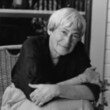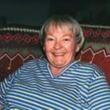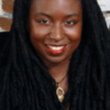Parable of the talents: a graphic novel adaptation
Description
More Details
Butler, Octavia E
Butler, Octavia E. creator
Jennings, John,1970- artist
141974948
Subjects
Fascism -- United States -- Comic books, strips, etc
Mothers and daughters -- Comic books, strips, etc
Outcasts -- Comic books, strips, etc
Religious communities -- Comic books, strips, etc
Twenty-first century -- Comic books, strips, etc
Young women -- Comic books, strips, etc
Excerpt
Similar Series From Novelist
Similar Titles From NoveList
Similar Authors From NoveList
Published Reviews
Booklist Review
Butler concludes the spiritual and physical journey, begun in Parable of the Sower (1993), of Lauren Oya Olamina, an 18-year-old African American who has survived most of her family's demise and a lengthy journey on the dangerous roads of early-twenty-first-century California. She has created her own religion, Earthseed, which empowers people to master change and has as its ultimate goal the colonization of other worlds. Olamina has gathered around her a community of outcasts and wanderers that is beginning to thrive when a fundamentalist Christian wins the presidency. His zealots overrun Olamina's village, enslave the adults with pain-inflicting collars, and adopt the children into Christian American families. Olamina must somehow free herself and her followers and begin another painful journey to find her infant daughter. She is unexpectedly reunited with her brother Marcus, but instead of helping each other, they are on opposite sides of a deep religious chasm. The novel revolves around the question of which is more important to Olamina: her fledgling religion or her own flesh and blood. --Roberta Johnson
Publisher's Weekly Review
Lauren Olamina, a black teenager, grew up in a 21st-century America that was tearing itself apart. Global warming, massive unemployment, gang warfare and corporate greed combined to break down society in general and her impoverished southern California neighborhood in particular. A victim of hyperempathy syndrome, a disorder that compels its victims to believe they feel others' pain, Lauren found herself homeless and alone in a violent world. Escaping from the urban jungle of Los Angeles, Lauren founded Acorn, a hard-working, prosperous rural community based on the teachings of Earthseed, a religion she herself created and centered on the ideas that God is Change and that humanity's destiny is to go to the stars. Butler's extraordinary Parable of the Sower (1996) detailed the aforementioned events. In this equally powerful sequel, Acorn is destroyed by the rising forces of Christian fundamentalism, led by the newly elected U.S. president, the Reverend Andrew Steele Jarret. A handsome man and persuasive orator, seemingly modeled in part on Pat Robertson, Jarret converts millions to his sect, Christian America, while his thugs imprison, rape and murder those they label "heathens," all the while kidnapping their children in order to raise them in Christian households. The narrative is both impassioned and bitter as Butler weaves a tale of a frighteningly believable near-future dystopia. Lauren, at once loving wife and mother, prophet and fanatic, victim and leader, gains stature as one of the most intense and well-developed protagonists in recent SF. Though not for the faint-hearted, this work stands out as a testament to the author's enormous talent, and to the human spirit.. Author tour. (Nov.) FYI: In 1995, Butler received a MacArthur Foundation ("genius") Award. (c) Copyright PWxyz, LLC. All rights reserved
Library Journal Review
In this brilliant sequel to Parable of the Sower (LJ 10/15/93), Nebula and Hugo Award winner Butler continues the compelling story of Lauren Olamina, chronicling her struggle for survival in a socially and economically depressed California in the 2030s. Lauren has founded a quiet community called Acorn, where she teaches people about Earthseed, her belief that God is simply another name for Change. Her community of believers is threatened, however, by the election of an ultraconservative president opposed to any religion not his own. Among his followers are fanatical terrorists who will stop at nothing to destroy what Lauren has built, including forcibly separating parents from their children. Butler tells this story through Lauren's journal entries, her poetry, and commentary from her daughter. Powerful, moving, and beautifully written, this book belongs in every library.Laurel Bliss, New Haven, CT (c) Copyright 2010. Library Journals LLC, a wholly owned subsidiary of Media Source, Inc. No redistribution permitted.
Booklist Reviews
Butler concludes the spiritual and physical journey, begun in Parable of the Sower (1993), of Lauren Oya Olamina, an 18-year-old African American who has survived most of her family's demise and a lengthy journey on the dangerous roads of early-twenty-first-century California. She has created her own religion, Earthseed, which empowers people to master change and has as its ultimate goal the colonization of other worlds. Olamina has gathered around her a community of outcasts and wanderers that is beginning to thrive when a fundamentalist Christian wins the presidency. His zealots overrun Olamina's village, enslave the adults with pain-inflicting collars, and adopt the children into Christian American families. Olamina must somehow free herself and her followers and begin another painful journey to find her infant daughter. She is unexpectedly reunited with her brother Marcus, but instead of helping each other, they are on opposite sides of a deep religious chasm. The novel revolves around the question of which is more important to Olamina: her fledgling religion or her own flesh and blood. ((Reviewed November 1, 1998)) Copyright 2000 Booklist Reviews
Publishers Weekly Reviews
Lauren Olamina, a black teenager, grew up in a 21st-century America that was tearing itself apart. Global warming, massive unemployment, gang warfare and corporate greed combined to break down society in general and her impoverished southern California neighborhood in particular. A victim of hyperempathy syndrome, a disorder that compels its victims to believe they feel others' pain, Lauren found herself homeless and alone in a violent world. Escaping from the urban jungle of Los Angeles, Lauren founded Acorn, a hard-working, prosperous rural community based on the teachings of Earthseed, a religion she herself created and centered on the ideas that God is Change and that humanity's destiny is to go to the stars. Butler's extraordinary Parable of the Sower (1996) detailed the aforementioned events. In this equally powerful sequel, Acorn is destroyed by the rising forces of Christian fundamentalism, led by the newly elected U.S. president, the Reverend Andrew Steele Jarret. A handsome man and persuasive orator, seemingly modeled in part on Pat Robertson, Jarret converts millions to his sect, Christian America, while his thugs imprison, rape and murder those they label "heathens," all the while kidnapping their children in order to raise them in Christian households. The narrative is both impassioned and bitter as Butler weaves a tale of a frighteningly believable near-future dystopia. Lauren, at once loving wife and mother, prophet and fanatic, victim and leader, gains stature as one of the most intense and well-developed protagonists in recent SF. Though not for the faint-hearted, this work stands out as a testament to the author's enormous talent, and to the human spirit.. Author tour. (Nov.) FYI: In 1995, Butler received a MacArthur Foundation ("genius") Award. Copyright 1998 Publishers Weekly Reviews






































